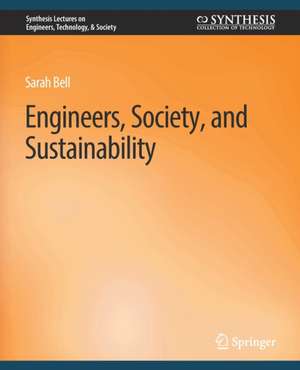Engineers, Society, and Sustainability: Synthesis Lectures on Engineers, Technology, & Society
Autor Sarah Bellen Limba Engleză Paperback – 10 aug 2011
Din seria Synthesis Lectures on Engineers, Technology, & Society
-
 Preț: 336.85 lei
Preț: 336.85 lei -
 Preț: 264.97 lei
Preț: 264.97 lei -
 Preț: 454.53 lei
Preț: 454.53 lei -
 Preț: 211.08 lei
Preț: 211.08 lei -
 Preț: 206.29 lei
Preț: 206.29 lei -
 Preț: 263.82 lei
Preț: 263.82 lei -
 Preț: 261.91 lei
Preț: 261.91 lei -
 Preț: 208.41 lei
Preț: 208.41 lei -
 Preț: 191.30 lei
Preț: 191.30 lei -
 Preț: 351.41 lei
Preț: 351.41 lei -
 Preț: 191.30 lei
Preț: 191.30 lei -
 Preț: 191.30 lei
Preț: 191.30 lei -
 Preț: 191.30 lei
Preț: 191.30 lei -
 Preț: 191.30 lei
Preț: 191.30 lei -
 Preț: 173.12 lei
Preț: 173.12 lei -
 Preț: 211.67 lei
Preț: 211.67 lei -
 Preț: 173.12 lei
Preț: 173.12 lei -
 Preț: 191.30 lei
Preț: 191.30 lei -
 Preț: 234.87 lei
Preț: 234.87 lei -
 Preț: 173.12 lei
Preț: 173.12 lei -
 Preț: 191.30 lei
Preț: 191.30 lei -
 Preț: 298.60 lei
Preț: 298.60 lei -
 Preț: 291.67 lei
Preț: 291.67 lei - 20%
 Preț: 358.70 lei
Preț: 358.70 lei -
 Preț: 290.90 lei
Preț: 290.90 lei
Preț: 207.83 lei
Nou
Puncte Express: 312
Preț estimativ în valută:
39.77€ • 41.09$ • 33.10£
39.77€ • 41.09$ • 33.10£
Carte tipărită la comandă
Livrare economică 25 martie-08 aprilie
Preluare comenzi: 021 569.72.76
Specificații
ISBN-13: 9783031009822
ISBN-10: 3031009827
Ilustrații: XIII, 95 p.
Dimensiuni: 191 x 235 mm
Greutate: 0.2 kg
Editura: Springer International Publishing
Colecția Springer
Seria Synthesis Lectures on Engineers, Technology, & Society
Locul publicării:Cham, Switzerland
ISBN-10: 3031009827
Ilustrații: XIII, 95 p.
Dimensiuni: 191 x 235 mm
Greutate: 0.2 kg
Editura: Springer International Publishing
Colecția Springer
Seria Synthesis Lectures on Engineers, Technology, & Society
Locul publicării:Cham, Switzerland
Cuprins
The Origins of Sustainability.- Ecological Modernisation.- Environmental Ethics.- Society and Technology.- Engineering Consumption.- Sustainable Urban Water Systems.- Engineering, Technology and Ethics.- Conclusion.
Notă biografică
Sarah Bell is a Chartered Engineer and academic staff member of the Department of Civil, Environmental and Geomatic Engineering at University College London. She began her career as a process and environmental engineer at an aluminium smelter in Australia before completing her PhD in Sustainability and Technology Policy at Murdoch University. She taught sustainable agriculture and land management at the University of Sydney before moving to UCL where she teaches engineering history, environmental systems engineering and an introduction to engineering for liberal arts students. Her research focuses on the interactions between society and technology as they impact on sustainability, with particular focus on urban water systems.
